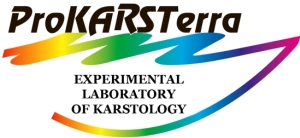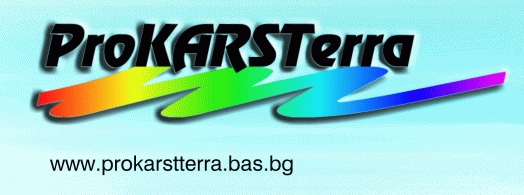
Educational activity of the Laboratory about/through karst
(within the framework of the ProKARSTerra-Edu specialized educational strategy)
Within the framework of the operational activity, through the Information and Training Center of the Laboratory, permanent training and consultations of pupils, students, PhD students and young scientists is carried out. It concerns the specialized equipment for karst research and monitoring as well as general theoretical- methodological issues of Karstology and karst geosystems. Also specialized lectures, seminars, practices and field training are organized.
At present 2 PhD students from the NIGG-BAS are trained at the Laboratory, and 1 has successfully defended his dissertation. With the active cooperation of the Laboratory, students from different Universities develop successfully and defend diploma theses with karst themes.
A number of original initiatives of the Laboratory are also being implemented in school education. The Laboratory organized a special scientific-practical forum “Protected karst territories – education and training” (23-26 September 2015, Sofia), dedicated to the integration between science and education in Karstology. During this forum, two round tables were held, discussing and supporting two new initiatives of the Laboratory, namely International Year of Karst and International Karst Science Competition (for high school students). From 2017, with the implementation of the project Innovative Education for /through Karst (within the framework of the general academic project for Introduction of modern methods in education and work with young talents) the Laboratory experiments actively different forms the research approach to education, applying interdisciplinary studies and experiments in a real karst environment.
Some of the original international educational initiatives of the Laboratory, as set out in the ProKARSTerra-Edu strategy, were also supported by UNESCO through three successful projects along the Programs for participation (2011-2012, 2014-2015 and 2018-2019). These projects made it possible to conduct:
- the already popular International Competition "Karst under protection – gift for the future generations" (2005, 2012, 2015, 2019);
- the first Summer Karst School (July 22-31, 2015, with participants from 7 countries). In 2017, under an educational project of the Bulgarian Academy of Sciences, it was possible to conduct the second Traveling School of Karst with participants from 7 Bulgarian schools;
- the first International Competition in Karstology for high school students ("Karst - the last white spot on the planet Earth" (4-9 August 2019, Brestnishka Karst Geosystem).
